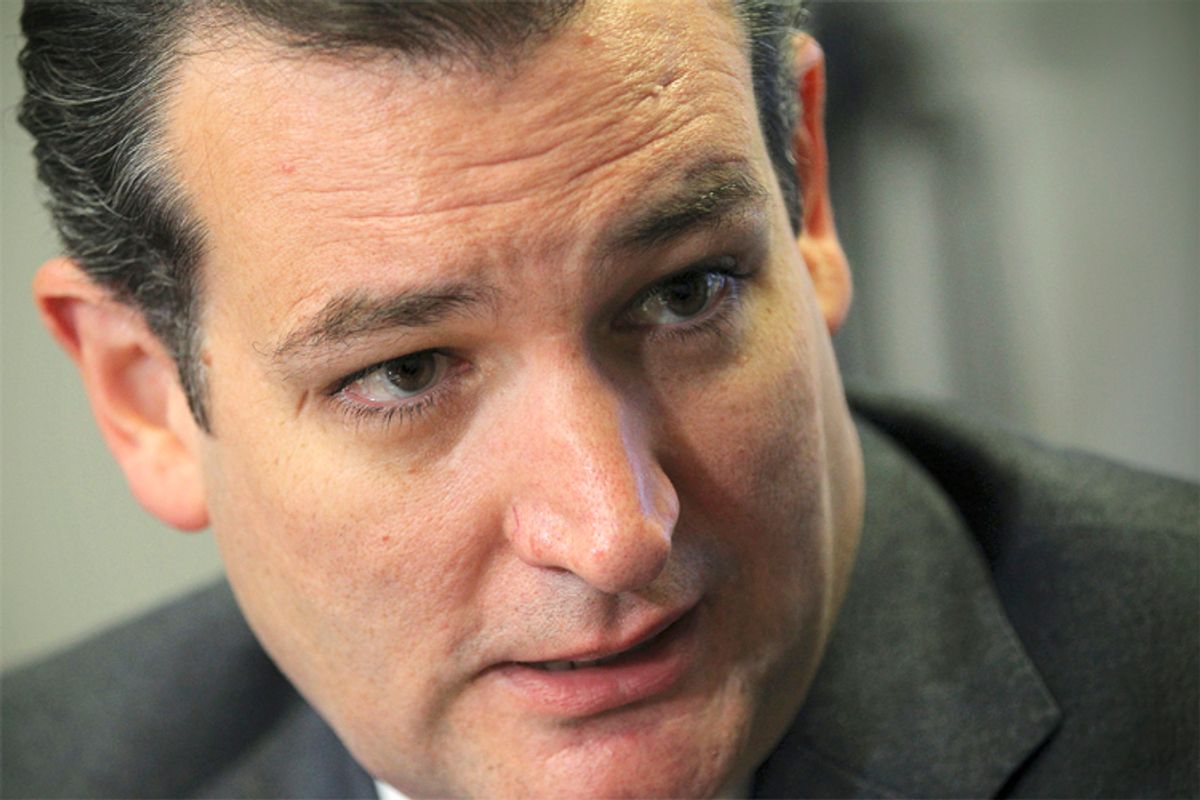Only a week ago Politico introduced us to a new Ted Cruz. The freshman senator who brought his party to historic public-approval lows by forcing last fall’s government shutdown had since worked on “thawing” his relationship with fellow Republicans. In “Ted Cruz plays nice,” we learned the effort was paying off: The firebrand was already “getting along reasonably well with most of his GOP colleagues.”
That was then. Now Cruz is promising to filibuster the debt-ceiling bill passed by House Democrats with 28 GOP votes. He wasn't expected to scuttle the deal, but he will force at least five of his GOP colleagues to join the Senate’s 55 Democrats to get it passed. Already, as the Senate votes, Kentucky's Mitch McConnell and Texas' John Cornyn, both facing primary challenges from their right, had to flip no votes to yes to defeat the filibuster. The actual measure still hasn't passed. (Update: The Senate evaded the filibuster with additional Republicans joining Cornyn and McConnell to make the final vote to advance the bill 67-31; then all 43 Republicans voted against it.)
“Under no circumstances will I agree to the Senate’s raising the debt ceiling with just 50 votes. I intend to object and force a 60-vote threshold,” Cruz told reporters Tuesday. “They don’t have to vote for it, I think Republicans should stand together and do the right thing. We should have every Republican stand together and follow the responsible course of action, which is to insist on meaningful spending reforms before raising the debt ceiling.”
So what happened to Politico’s new Ted Cruz? Well, he’s probably looked over at Chris Christie and realized that another 2016 contender has self-imploded more spectacularly than he did. Although Cruz saw his own national-poll standing drop after his shutdown histrionics, it was nothing compared with Christie’s plunge. Tragically for Christie, he now trails Hillary Clinton, in a hypothetic 2016 matchup, by more than the wildly polarizing Cruz does.
In a February Texas Monthly profile, Cruz hardly seems worried about the enmity of his fellow Republicans. He’s unapologetic about his role in the hugely unpopular government shutdown. He considers himself vindicated by the Affordable Care Act troubles that emerged after the shutdown, from glitches in the website to the controversy over canceled plans. And he remains the most popular statewide figure in Texas politics.
Politico’s case for a kinder, gentler Cruz was never convincing anyway. The only evidence mustered was that he’d dined with Sen. John McCain, who famously called him a "wacko bird" last year, and cracked jokes with Sen. Lindsey Graham, who subsequently praised him to reporter Manu Raju.
It’s clear that Cruz has 2016 fever again, and a debt-ceiling filibuster is just what he needs to cement his status as the Tea Party standard-bearer (he’s in a virtual tie with Sen. Rand Paul in the latest Tea Party polls). Cruz is heading to Iowa yet again next month, and in April he’ll visit the first-primary state, New Hampshire, for a “Freedom Summit,” along with Rand Paul and Mike Huckabee.
A few Republicans have criticized Cruz’s debt-limit showboating. “Maybe Ted Cruz should spend a little time trying to win the Senate instead of attacking his fellow Republicans,” Rep. Adam Kinzinger, R-Ill., said Tuesday. “I thought that Ted Cruz was past [that], but maybe he isn’t.”
On CNN’s “Crossfire” Nevada GOP Sen. Dean Heller also opposed Cruz’s filibuster plan. “I don’t think it’s right,” he said. “At the end of the day, we’re going to pass a clean debt ceiling increase with Ted’s or without Ted’s support, with my support or without my support. But at the end of the day, there’s going to be a debt ceiling increase and it’s going to be clean.”
That's true. We now know one thing: Ted Cruz is no longer playing nice. He forced 12 of his fellow Republican senators effectively to go on record in favor of hiking the debt limit, votes that will put them on the bad side of Tea Party primary challengers and the nihilistic right-wingers at Heritage. Ted Cruz has proved that he's a party of one, unable to work effectively with his fellow Republicans, or on behalf of his country.



Shares